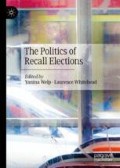Abstract
Between 1947 and 2014, there were 1527 signature collections aiming to trigger a recall and 485 binding recall votes in Japan. There is even the option to recall public servants; however, in that case, parliament would have the final say. While recall activity was particularly strong right after World War II and during phases of major territorial reforms on the local level, recently there has been almost a complete halt of signature collections with the aim to trigger it. Out of the several hundreds of recall referendums, this chapter examines three cases in more detail: Maki 1996, Akune 2010, and Nagoya 2011. The chapter will thus shed some light on the lesser-known history, practice, functions and consequences of recall referendum procedures in the country. Recall activity dynamics over time are studied with the help of newly updated data based on original Japanese governmental sources.
Access this chapter
Tax calculation will be finalised at checkout
Purchases are for personal use only
Notes
- 1.
Akune City Scandal, 2 October 2010, http://japanvisitor.blogspot.jp/2010/10/akune-city-scandal.html (last accessed 4 June 2017).
- 2.
Attack on bureaucrat pay ousts city mayor, The Japan Times, 21 April 2009, http://www.japantimes.co.jp/news/2009/04/21/national/attack-on-bureaucrat-pay-ousts-city-mayor/#.WTOOLcaB3BI (last accessed 4 June 2017).
- 3.
Recall of a mayor, The Japan Times, 10 December 2010, http://www.japantimes.co.jp/opinion/2010/12/10/editorials/recall-of-a-mayor/#.WTOKtsaB3BI (last accessed 4 June 2017).
- 4.
Wishy-washy Akune residents recall assembly in referendum, The Japan Times, 22 February 2011, http://www.japantimes.co.jp/news/2011/02/22/national/wishy-washy-akune-residents-recall-assembly-in-referendum/#.WTOSJMaB3BI (last accessed 4 June 2017).
- 5.
Nagoya mayor petitions to recall city assembly, The Japan Times, 21 August 2010, http://www.japantimes.co.jp/news/2010/08/21/national/nagoya-mayor-petitions-to-recall-city-assembly/#.VuKd7FQzrlZ (last accessed 4 June 2017).
- 6.
Nagoya recall petition fails, The Japan Times, 25 November 2010, http://www.japantimes.co.jp/news/2010/11/25/national/nagoya-recall-petition-fails/#.WTTfIsaB3BJ (last accessed 4 June 2017).
- 7.
Tax cut advocate Kawamura cruises to fourth term as Nagoya mayor, The Japan Times, 24 April 2017, http://www.japantimes.co.jp/news/2017/04/24/national/politics-diplomacy/kawamura-looks-set-secure-fourth-term-nagoya-mayor/#.WTTYTMaB3BI (last accessed 4 June 2017).
References
Baerwald, H. H. (1959). The Purge of Japanese Leaders Under the Occupation. Berkeley and Los Angeles: University of California Press.
Buček, J., & Smith, B. (2000). New Approaches to Local Democracy: Direct Democracy, Participation and the ‘Third Sector’. Environment and Planning C: Politics and Space, 18(1), 3–16.
Croissant, A. (2004). From Transition to Defective Democracy: Mapping Asian Democratization. Democratization, 11(5), 156–178.
Haddad, M. A. (2012). Building Democracy in Japan. Cambridge: Cambridge University Press.
Hug, S. (2004). Occurrence and Policy Consequences of Referendums: A Theoretical Model and Empirical Evidence. Journal of Theoretical Politics, 16(3), 321–356.
Jain, P. C. (1991). Green Politics and Citizen Power in Japan: The Zushi Movement. Asian Survey, 31(6), 559–575.
Kobori, M. (2009). Referendums in Britain and Japan: Turnouts, Campaigns, and Systems. Ritsumeikan Law Review, 26, 1–25.
MacDougall, T. (2001). Towards Political Inclusiveness: The Changing Role of Local Government. In M. Muramatsu (Ed.), Local Government Development in Post-War Japan (pp. 29–62). Oxford: Oxford University Press.
Matsuno, M. (1981). Genko Chokusetsu Seikyu Seido no Seiteikatei [Decision Making Process of the Current Direct Demand System]. Shimadai-Hogaku, 24(2/3), 89–106.
Moreno, E., Crisp, B. F., & Shugart, M. S. (2003). The Accountability Deficit in Latin America. In S. Mainwaring & C. Welna (Eds.), Democratic Accountability in Latin America (pp. 79–131). Oxford: Oxford University Press.
Neary, I. (2002). The State and Politics in Japan. Cambridge: Polity Press.
Numata, C. (2006). Checking the Center: Popular Referendums in Japan. Social Science Japan Journal, 9(1), 19–31.
Okamoto, M., Ganz, N., & Serdült, U. (2014). Direct Democracy in Japan. C2D Working Paper Series, 47, 1–24. https://doi.org/10.5167/uzh-103334.
Rothstein, B. (1996). Political Institutions: An Overview. In R. E. Goodin & H.-D. Klingemann (Eds.), A New Handbook of Political Science (pp. 133–166). Oxford: Oxford University Press.
Schmitter, P. C. (2005). The Ambiguous Virtues of Accountability. In L. Diamond & L. Morlino (Eds.), Assessing the Quality of Democracy (pp. 18–31). Baltimore: The Johns Hopkins University Press.
Schmitter, P. C. (2010). Twenty-Five Years, Fifteen Findings. Journal of Democracy, 21(1), 17–28.
Serdült, U. (2015). A Dormant Institution: History, Legal Norms and Practice of the Recall in Switzerland. Representations, 51(2), 161–172.
Serdült, U., & Welp, Y. (2017). The Levelling Up of a Political Institution: Perspectives on the Recall Referendum. In S. P. Ruth, Y. Welp, & L. Whitehead (Eds.), Let the People Rule? Direct Democracy in the Twenty-First Century (pp. 137–156). Colchester: ECPR Press.
Shimizutani, S. (2010). Local Government in Japan: New Directions in Governance Toward Citizens’ Autonomy. Asia-Pacific Review, 17(2), 99–117.
Steiner, K. (1965). Local Government in Japan. Stanford: Stanford University Press.
Tsujiyama, T. (2000, Spring). Local Self Governance in Japan: The Realities of the Direct Demand System. Nira Review, 26–30.
Vosse, W. (2000). The Emergence of a Civil Society in Japan. Japanstudien, 11(1), 31–53.
Welp, Y. (2016). Recall Referendums in Peruvian Municipalities: A Political Weapon for Bad Losers or an Instrument of Accountability? Democratization, 23(7), 1162–1179.
Whitehead, L. (2018). The Recall of Elected Officeholders: The Growing Incidence of a Venerable, but Overlooked Democratic Institution. Democratization, 25(8), 1341–1157.
Yokomichi, K. (2007). The Development of Municipal Mergers in Japan. Tokyo: CLAIR. Retrieved from http://www.clair.or.jp/j/forum/honyaku/hikaku/pdf/up-to-date_en1.pdf.
Sources and Government Reports
CLAIR (Council of Local Authorities for International Relations). (2019). Local Government in Japan 2016 (2018 Revised Edition), Tokyo. Retrieved from http://www.clair.or.jp/j/forum/pub/docs/jichi2018-en.pdf.
Government of Japan. (2010). Chiho Jichi Ho [Local Autonomy Law, LAL], E-Gov. Retrieved from http://law.e-gov.go.jp/htmldata/S22/S22HO067.html.
JPC-SED (The Japan Productivity Center for Socio-Economic Development). (2001). Chiho-bunken to Jumin-sanka wo kangaeru [Thinking on Decentralization and Citizens’ Participation]. The Japan Productivity Center for Socio-Economic Development, Tokyo.
MHA (Ministry of Home Affairs). Chihojichi Geppo. No.6–9, 12, 23, 29, 37, 38, 41–43, 45–52.
MIC (Ministry of Internal Affairs and Communications). Chihojichi Geppo. No.53–59.
Author information
Authors and Affiliations
Corresponding author
Editor information
Editors and Affiliations
Rights and permissions
Copyright information
© 2020 The Author(s)
About this chapter
Cite this chapter
Okamoto, M., Serdült, U. (2020). Recall in Japan as a Measure of Vertical Accountability. In: Welp, Y., Whitehead, L. (eds) The Politics of Recall Elections. Palgrave Macmillan, Cham. https://doi.org/10.1007/978-3-030-37610-9_6
Download citation
DOI: https://doi.org/10.1007/978-3-030-37610-9_6
Published:
Publisher Name: Palgrave Macmillan, Cham
Print ISBN: 978-3-030-37609-3
Online ISBN: 978-3-030-37610-9
eBook Packages: Political Science and International StudiesPolitical Science and International Studies (R0)

